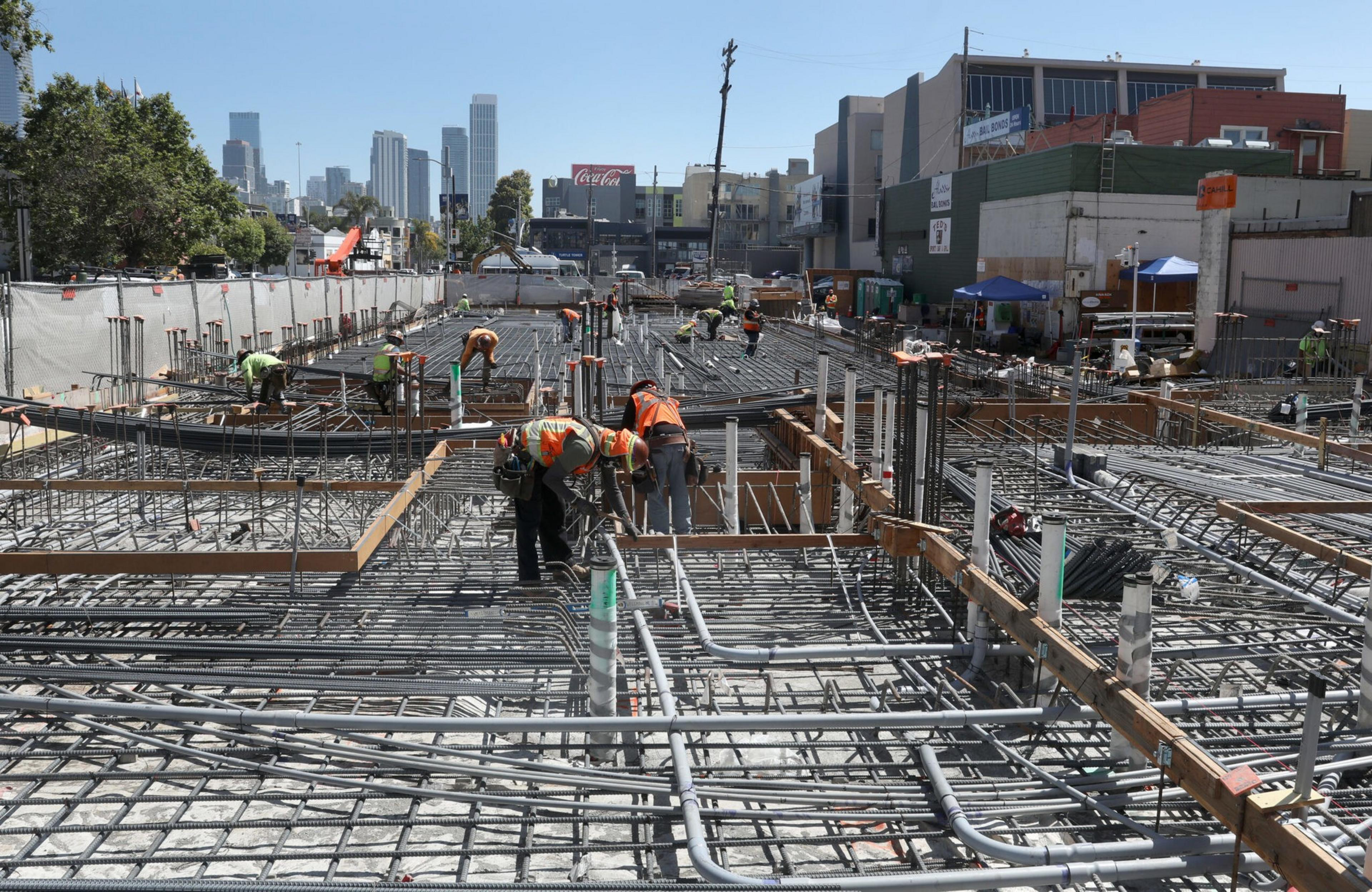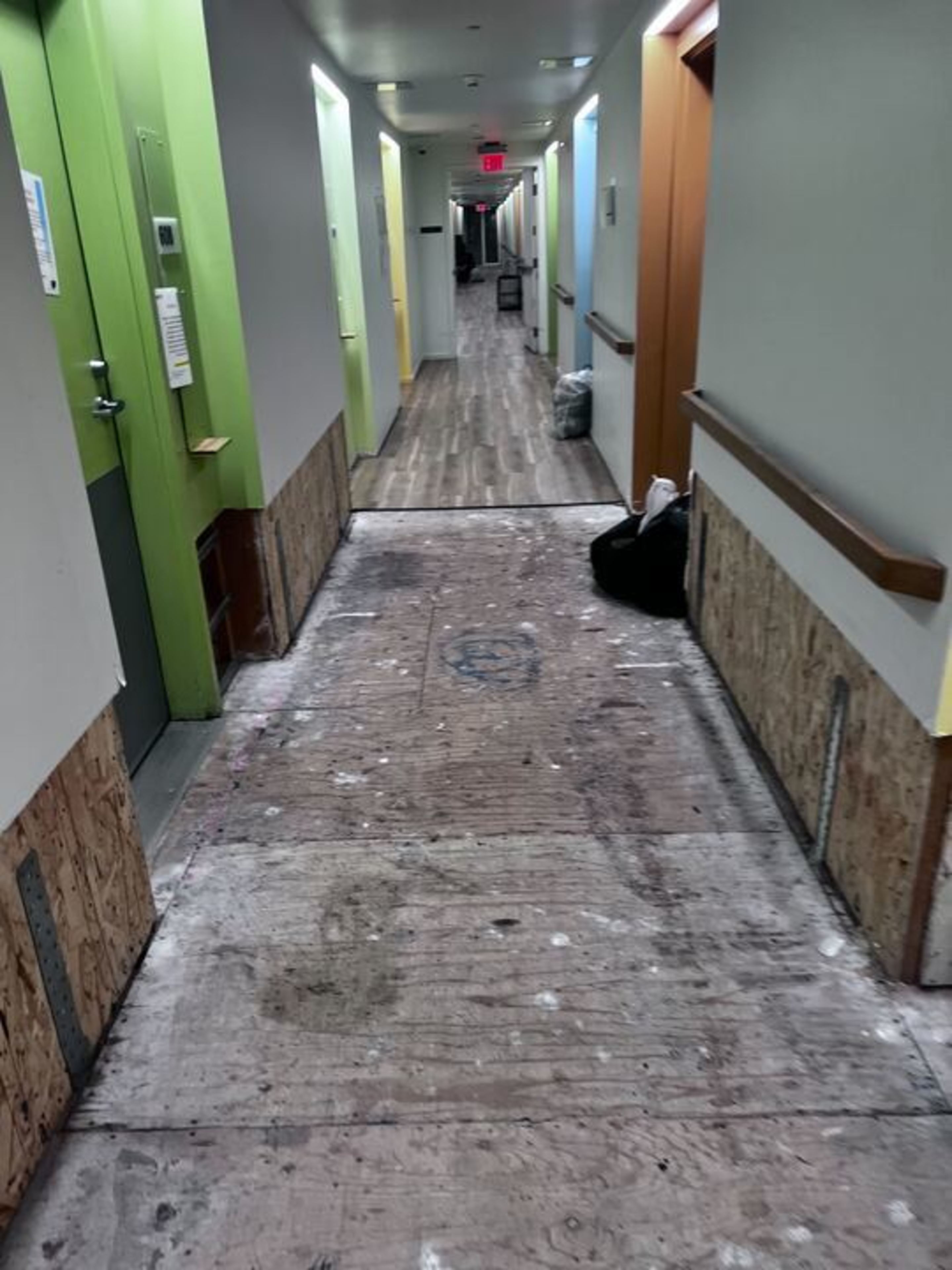San Francisco mayoral candidate Daniel Lurie frequently mentions what he considers his crowning achievement: He was able to build housing faster and cheaper than City Hall could.
The nonprofit founder, Levi Strauss heir, and self-styled political outsider likes to put the spotlight on one project in particular: 833 Bryant St., a 146-unit affordable housing site near the Hall of Justice in SoMa, designed for formerly homeless individuals.
Lurie asserts that his organization Tipping Point Community built the facility in three years for $377,000 a unit, versus an average of seven years and up to $1.2 million per unit for city-led projects. He called this “an innovative model that shattered the norms responsible for San Francisco’s housing crisis.”
Now, as polling shows a path to victory for Lurie in the mayoral race, his opponents and critics are sharpening their attacks. They accuse him of misrepresenting his housing record, arguing that the project at 833 Bryant St., constructed with modular units and kick-started with massive private funds, cannot be replicated at scale and pointing to tenant complaints and apparent maintenance issues.
Joe Arellano, campaign spokesman for Mayor London Breed, mocked Lurie as a “guy who used to run a nonprofit with 10 employees” and ridiculed his promotion of 833 Byrant St. that fails to mention the assistance his organization received from Breed’s administration. The project was a public-private partnership, leveraging tax credits, financing help, and long-term operational funding from the city.
“Daniel Lurie has no real experience to be mayor, so he’s been padding his résumé with 833 Bryant,” Arellano said. “It’s reckless and dangerous.”
‘Not replicable’
Lurie founded Tipping Point Community, an anti-poverty nonprofit, in 2005 and vowed to drastically reduce homelessness. The organization secured tens of millions of dollars in donations from philanthropists Charles and Helen Schwab and partnered with nonprofit builder Mercy Housing, the mayor’s office, and San Francisco Housing Accelerator Fund to build 833 Bryant St.
One reason for the project’s low cost was the use of modular construction from a factory in Vallejo; the semi-finished housing units were delivered to San Francisco for final assembly.
However, this methodology faced opposition from local labor unions, whose members were replaced by lower-paid out-of-town workers, according to Larry Mazzola Jr., president of the San Francisco Building and Construction Trades Council.
“Cheaper isn’t always better,” Mazzola told The Standard. “Daniel Lurie is not telling you the whole truth.”

In a 2021 letter (opens in new tab) to elected officials, Mazzola detailed construction issues at 833 Bryant St.; particularly, what he described as plumbing errors and other flaws in every unit. The letter urged city leaders to reject modular housing projects. Tipping Point, Housing Accelerator Fund, and Mercy Housing refuted (opens in new tab) Mazzola’s claims, saying the project workers were “union craftspeople” who were paid the “prevailing wage” and standing by the building quality.
The opposition from the influential construction union created a political hurdle for future modular housing, prompting Board of Supervisors members to express reluctance (opens in new tab) to support such projects.
“[Lurie] keeps touting this one project, but it’s not replicable in San Francisco,” Supervisor Ahsha Safaí, another mayoral candidate, told The Standard. A longtime labor union ally, Safaí said the city approved 833 Bryant St. and a few other modular housing sites as experimental cases but is unlikely to greenlight any more.
YIMBY Action, one of the most outspoken pro-housing groups, agrees with Safaí.
“One of the many things that kept costs down for that project was the use of modular housing, which no one else has even attempted in San Francisco since,” said Jane Natoli, YIMBY Action’s San Francisco organizing director. “Unless and until someone has a concrete plan to navigate that, we won’t see any other projects built like that.”
Critics also point out the massive private donations (opens in new tab) that funded 833 Bryant St. A new affordable housing project in the Mission is based on private donations and claims to be faster and cheaper to construct than typical methods but is not modular.

In a statement, Lurie expressed confidence he could “overhaul the corrupt bureaucracy” but did not provide specifics on how he would overcome labor or political hurdles to build affordable housing — even if he were able to leverage his ultra-wealthy network to raise funding.
“I am proud of my record,” Lurie said. “I have delivered once, and I will deliver again.”
Fire, floods, mold
Living conditions inside 833 Bryant St. have also become a target for political attacks. Since the facility opened in 2022, the SF Department of Building Inspection has received about 21 complaints (opens in new tab).
Mark Farrell, a former interim mayor who’s also running to replace Breed, said during a televised debate (opens in new tab) that someone was “electrocuted” in the building and cited flooding and dirty water there.
Farrell was referring to a complaint from early 2023 in which an apparent tenant wrote (opens in new tab), “when I plugged in my vacuum I got a shock” and claimed the building is “not safe” and “unfinished.” Other complaints focused on elevator malfunctions, floods, and unsanitary conditions.
Gallery of 2 photos
the slideshow
Tipping Point is not directly involved in tenant issues at 833 Bryant St., which is managed by Mercy Housing. Although maintenance issues are common in low-income housing, Safaí and Mazzola alleged that some of the problems were attributable to the “poorly built” modular construction.
Tenants who spoke with The Standard during a visit to 833 Bryant St. confirmed some of the complaints, such as constant fire alarms, flooding, and leaks.
Emory Suchan, 53, a disabled tenant who has lived in the building since late 2021, reported problems with washing machines and elevators. But he said management tries to keep the place clean.
One tenant, who wished to remain anonymous over retaliation concerns, shared photos of a dirty hallway and moldy walls in bathrooms that matched one recent complaint (opens in new tab) of “mushrooms” growing.
Mercy Housing California president Doug Shoemaker responded that there are “no reports of organic growth” and said that if it’s within a unit, management would not necessarily be aware. He said it is common to see flooding caused by residents struggling with mental health issues, and such issues are not related to design or construction flaws.
Building staff said there has been one incident of a false fire alarm caused by a tenant misusing an electric stove in a unit.
Shoemaker described the project as “overwhelmingly positive” in terms of building housing quickly and cheaply. He dismissed criticism as “potshots at good work.”
“I invite [Farrell and Safaí] to reach out to me directly to learn more about the success of this community,” Shoemaker said.
Shawn Savoy, 48, a tenant in the building, said it is infested with roaches brought in with the belongings of formerly homeless residents. But he’s happy to have a roof over his head.
“It’s still livable here,” Savoy said. “I just wish the people cared [about the building] more.”


